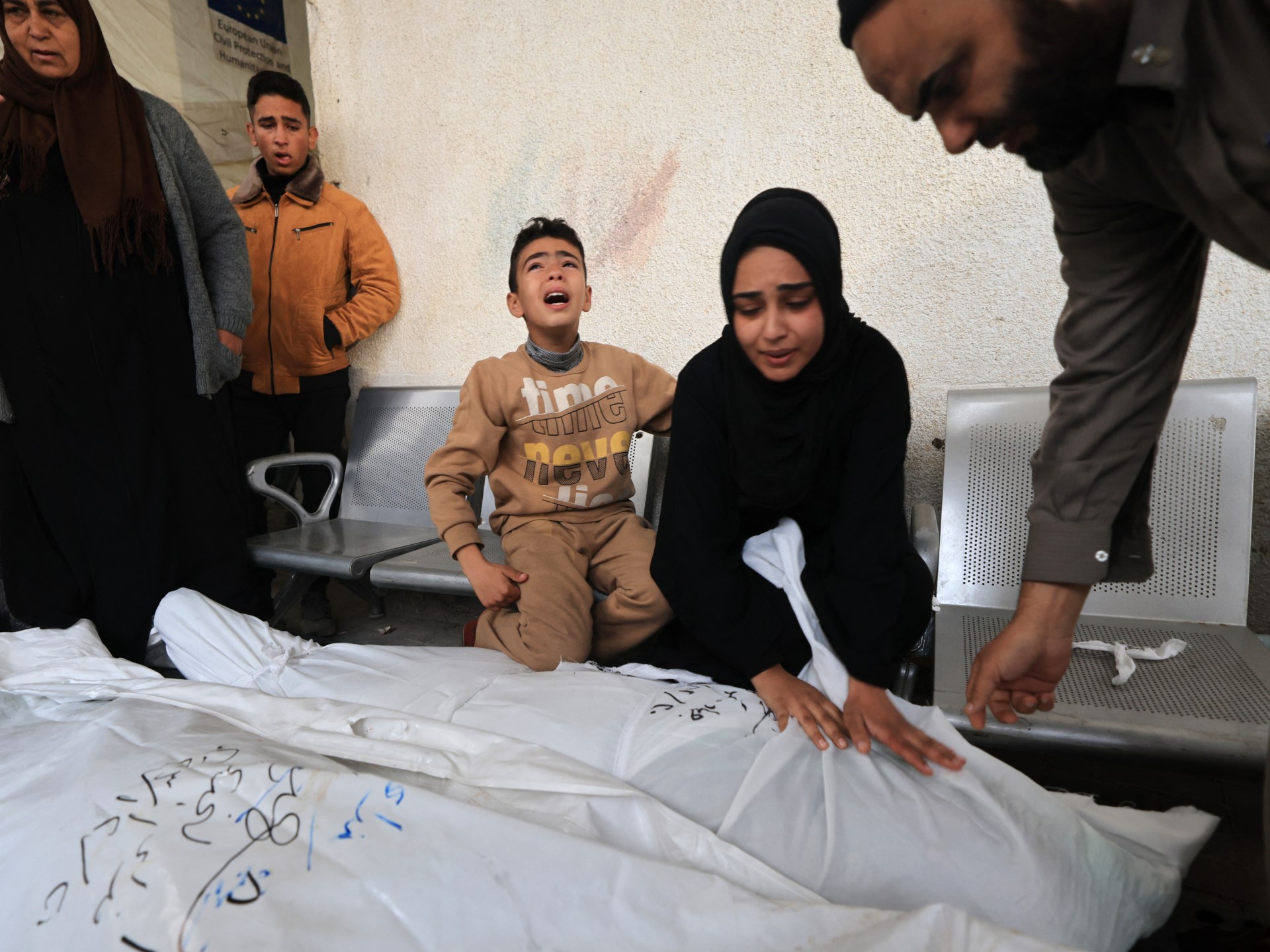In Jabalia refugee camp, north of Gaza, the cries of an 11-year-old boy named Ahmad pierce the air. “I want my Baba, my Baba, Baba,” Ahmad sobs. His plea echoes through the camp, exposing the profound void left by the murder of his father at the hands of the Israeli occupation forces.
“Where are you, Baba? Why did they murder you? What crime did he commit?”
People attempt to console the grief-stricken boy but he is beyond consolation: “He promised me to stay alive and not to go. I’m tired. Leave me alone.”
Meanwhile, a few thousand kilometres away in Belgium, another Palestinian boy, 15-year-old Zain, mourns the loss of his father, Al Jazeera cameraman Samer Abudaqa. Zain recounts the tragedy that unfolded on December 15, revealing the cruelty of his father’s murder by an Israeli drone.
After being struck by shrapnel, Samer bled to death for five hours on the grounds of Farhanah, the high school I went to in Khan Younis. Three members of an ambulance team, including my friend, Rami Budeir, who attempted to rescue Samer, were also targeted and killed.
The enormity of the atrocity is etched into Zain’s tearful eyes and face as he speaks about his father. He pledges to pray for him every day. His voice breaks as he sings a song he had written for his dad. “My heart is missing you. Separation tortures me. My heart, after you, is lost, and bitterness is the taste in my mouth.”
Zain’s words in Belgium, Ahmad’s cries in Jabaliia reach me here in Edmonton, Canada.
I find myself sobbing, unable to shake the images of their pain or grapple with the questions they evoke. My heart has shattered a thousand times in the past 80 days and it breaks once more. I am unable to escape the thoughts of these children, enduring the lasting trauma of being intentionally made orphans by a genocidal army.
What makes the pain all the more unbearable is that Zain is the same age as my own son, Aziz, and strikingly resembles him in every aspect – facial features, height, body, voice, and even the choices of clothes and hairstyle. These uncanny similarities intensify the deep sorrow I feel towards Zain and the hundreds of thousands of children who have lost parents, relatives and friends in Gaza.
As I think of Zain and his father who was targeted while wearing a press vest, my thoughts wander to another Palestinian orphan, 12-year-old Donia Abu Muhsen.
Donia was recovering in Nasser hospital in Khan Younis, when Samer’s body was brought in and prepared for funeral. Israeli bombardment of a house where Donia and her family were taking shelter had killed her parents and two siblings and smashed her leg which necessitated an amputation.
When Donia looks at the camera in a video shot a few days before her death, there has a faint smile on her face. Her will to live and dream are strong. She says she wants to study and become a doctor. “We are alone now without [my family]. I was very much connected to [them]. But I must continue,” she says.
But the Israeli occupation forces did not allow her to. Two days after they murdered Samer, they killed Donia’s dream. They shelled Nasser hospital, murdering the orphaned girl in her hospital bed.
I wonder about other children who survive but their hearts and bodies are broken, with no one left of their extended families to take care of them. Another young orphan, perhaps Donia’s age, shares her harrowing story in another video. She recounts the loss of 70 people, including her parents, siblings, grandparents, aunts, and uncles, while seeking refuge in a chalet on the beach after losing their home.
Only she and her five-year-old brother Kanan survived. Unable to walk and in urgent need of an operation, she prays for the opening of the Rafah crossing, hoping for a chance to leave.
She is one of the 55,000 wounded people who are currently abandoned by the world scattered across Gaza where a man-made medical collapse is taking place. Tearfully, and in a voice and with a facial expression that could break the hardest rock, the girl says, “If the border doesn’t open within 48 hours, I won’t be able to walk again. I’m in great pain, and I miss walking and my parents deeply.”
In the face of the horror and pain the children of Gaza are experiencing, the cry for justice is not a mere plea, it is a global call to humanity, to its collective conscience, if it still exists.
This comes at a time, when the powers that be, led by America, openly endorse this genocide and stand in the way of putting an end to it. They are making sure that more children will be orphaned, starved, made homeless, bombarded day and night, and denied access to healthcare, education, and parental love and care.
Yet, there is also a growing chorus of voices of peace and hope as well.
Russian-American activist Masha Gessen, upon receiving the Hannah Arendt Prize, highlighted the critical opportunity the world still possesses to intervene in Gaza. Gessen emphasised, “The biggest difference between Gaza and the Jewish ghettos in Nazi-occupied Europe is that many Gazans, most Gazans are still alive, and the world still has an opportunity to do something about it.”
Though we couldn’t save Donia and the parents of Zain, Ahmad and the little orphaned girl, there remains a chance to save those who are still alive in Gaza. We need ceasefire now!
The views expressed in this article are the author’s own and do not necessarily reflect Al Jazeera’s editorial stance.
Sumber: www.aljazeera.com
 Skip to content
Skip to content

